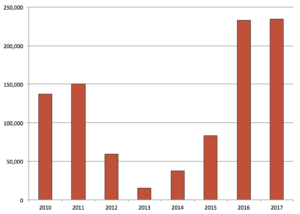If you feel drained of ideas and motivation, that could be a sign that you need to take a writing break and let yourself entirely off the hook. Spend the day reading a book, catching up on TV, or actually, you know, interacting with people. I find that having conversations with other writers and creators is often the best way to find inspiration again.
But let’s assume for a moment that you can’t take a break and you have to write no matter what (ahem, like when you’re in the middle of NaNoWriMo). What do you do on those days when you have to force yourself to write?
Maintaining a Streak
If you’re writing to maintain a streak and it doesn’t matter what you write, so long as you write, it may be a day to shelve the current work in progress and try something new.
Shift over to your ideas notebook, grab a random prompt from the internet (there are a jillion, so if you don’t have a favorite site bookmarked, Google “creative writing prompts” or “writing prompt generator”), or ask your friends if there’s a story they’d like to be told. I’ve written some fun one-offs about my original characters inspired by things my friends prompted me or scenes they wish they’d read.
If you’re still struggling to get any words on the page, or are generally finding yourself uninspired, it’s time for some free writing. This free writing could eventually evolve into a blog post or story, but it might just be an activity to get you writing again.
Start with a question about what’s bugging you. This could be anything from, “Why am I so tired today?” to “How am I so uninspired?” Once you have that question nailed down, twist it into a question you can analyze and/or give advice about. “Why am I so tired today?” might become “How can you write when you’re tired?” or “What’s the greatest obstacle between a writer and a nap?” or “Why is sleep so important to the creative process?” Once you have a question, and one that is built on a topic that’s currently bugging you, you have something to write about. And turning it into a question that you can either analyze or give advice about lets you turn free writing about your problems into a positive exercise. Too often free writing about problems can turn into negative thoughts and self-immolation, but turning it into a question to be answered lets you think about the same topic in a completely different way and hopefully can inspire you to help yourself!
Writing to a Deadline
If you’re writing for a deadline and you must work on a specific piece, the real problem is that you have to find inspiration in a specific work, so jumping to other pieces isn’t always an option.
But it’s still where I would start.
When feeling totally uninspired on one story, I start by writing on something else. If you have another project in progress, spending some time on that might reinvigorate your motivation for the deadline project. If no other project is available, you can take any of the suggestions above and apply them here—prompts, free writing with a question, etc.
No matter what you’re writing, set a timer to limit how much time you spend working on other activities or projects. I recommend 10–15 minutes for warm-up writing before trying to get back to the project you’re supposed to be working on.
Or, instead of writing something different, you can use prompts that allow you to work with the same characters or the same world, essentially approaching your deadline project from the side instead of head-on. Try posing what-if situations for your characters, alternate scenes/endings, or writing something from the perspective of someone else in your world.
You can use a similar strategy as the suggested free writing activity by answering a question related to the thing you’re stuck on—”How can my character get out of this situation?” or “Who should my character partner with for this mission?” or “How does the world’s society/laws limit my character?” Using the free writing format as an opportunity to organize your thoughts can help you work through the problem in a different way than just thinking about it. (This is why so often solutions might come when we’re talking to someone else, rather than when we’re just thinking to ourselves. Different ways of communication allow us to organize our thoughts differently, so if you don’t have a friend on hand, have a conversation with a blank page!)
If you absolutely must be working on your deadline-driven project and don’t have time for warm-up activities, try reading the last 1-2 pages you’ve written and allow yourself to revise and edit them. One of the best ways for me to get back into a story is by working to flesh out the last thing I wrote. If the last thing I wrote is literally what stumped me—and I had difficulty figuring out where the story goes next—I rewrite from where the story started to derail. Sometimes I might keep all the action and description, but change the dialogue. Sometimes I might move the setting. Sometimes I might scrap the entire idea, or even shift who is in the scene and take the whole thing in a completely different direction! It may not feel like you’re getting anywhere (especially if you end up trashing that version and starting again), but what you’re doing is eliminating the ideas that aren’t working and helping find the idea that does work.
No matter what’s going on with you creatively, there are ways to dig deep on those days when you’re feeling drained. And the more often you practice digging deep, the easier it can get. I still sometimes hit days when I’m totally worn out and need a break, and on those days I write my minimum word count using one of the strategies above and call it a day. But because I’ve put in so much effort, it’s easy for me to use one of those strategies and see success. So even if it’s hard now, know that putting in the hard work will help train you as a writer and eventually you’ll be able to sail past those inspiration-less days with no trouble.





